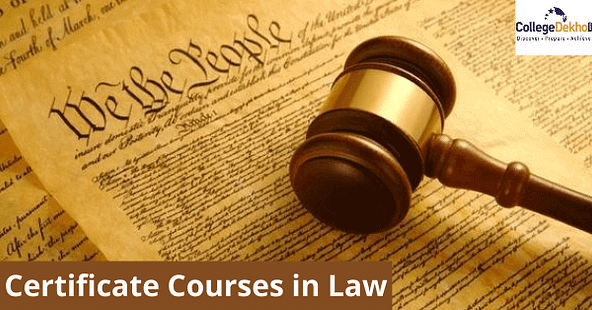Curious about Certificate Courses in Law? Check the detailed list of certificate law courses such as Human Rights, Energy Laws, Consumer Protection Law etc. along with top colleges, advantages, eligibility criteria, admission process, and future scope.
- Merits of Pursuing Certificate Courses in Law
- List of Certificate Courses in Law
- Top Colleges Offering Certificate Courses in Law
- Eligibility Criteria of Certificate Courses in Law
- Admission Process of Certificate Courses in Law
- Skills Required for Certificate Courses in Law
- Important Subjects taught in Certificate Courses in Law
- What After Certificate Courses in Law?
- Top Recruiters After Certificate Courses in Law?

Certificate courses are a stepping stone to gaining expertise in a function. Students looking at developing a specific skill or knowledge within a short period of time are actively pursuing these law courses. In the field of legal education, aspirants generally go for law certificate courses to align a program towards a set career goal or academic interests. Specialisations in Cyber Law , Intellectual Property Law , Rural Law, Energy Law , etc. can be done through the certificate law courses. These courses can be pursued through a regular or distance mode from top law colleges in Eastern, Western , Northern , or Southern parts of India.
The short-term courses in law are the certifications of graduation level and help gain expertise in a desired field or subject . Not only do they explain the framework of legal systems but also explore the theory of law. If a law aspirant is considering pursuing a certificate course in law without a law degree, it is important to make sure that he/she possesses the necessary qualifications and prerequisites. Scroll through the article to get an in-depth understanding of certificate courses in law, their eligibility criteria, and how to pursue them.
Merits of Pursuing Certificate Courses in Law
Certificate law courses are in huge demand due to numerous reasons. Enlisted below are a few of them.
- The major advantage that governs the decision of students to pursue law certificate courses is the time span. Unlike LLB , these courses can be completed within the duration of 1 month to 1 year.
The certificate courses in law are designed keeping in view a particular specialization or course of study. Students willing to master a specific field can go for certificate courses under law-relevant specialization.
Some colleges grant access to higher legal programmes like an LLM , after completing a certificate law course.
Students hailing from different backgrounds such as medicine or business, go for certificate courses in law in order to be eligible for a quick career change. However, not all certificate level-law courses provide this advantage. Some colleges only accept students from legal backgrounds to pursue this course while certain colleges accept cross-disciplinary exchange.
Certificate courses in law highlight the commitment of a candidate towards a specific field of law which further helps them in getting refined employment opportunities.
Some certificate law courses can be pursued through correspondence or distance education. Students can study at any place and anytime as per their convenience. Here is an entire list of distance learning courses and colleges in law.
List of Certificate Courses in Law
Given below is a list of certificate courses in law that a student can consider for enrollment.
Course Name | Course Duration | Fee Range (Annual) |
|---|---|---|
Certificate in Human Rights | 6 Months - 2 Years | ₹1,000 - ₹9,000 |
Certificate in Energy Laws in India | 2 Months - 6 Months | ₹5,000 - ₹ 8,000 |
Certificate in Anti-Human Trafficking | 6 Months - 2 Years | ₹1,400 to ₹8,000 |
Certificate in Law and Medicine | 6 Months - 2 Years | ₹1,500 to ₹20,000 |
Certificate in International Humanitarian Law | 6 Months - 1 Year | ₹2,700 to ₹10,000 |
Post Graduate Certificate Course in Human Rights | 1 Year - 2 Years | ₹4,000 to ₹15,000 |
Certificate in Industrial and Labour Laws | 3 Months - 6 Months | ₹4,000 to ₹23,000 |
Certificate in Legislative Drafting | 6 Months - 18 Months | ₹1,200 to ₹9,000 |
Certificate in Consumer Protection Law | 4 Months - 6 Months | ₹1,500 to ₹9,000 |
Certificate in Intellectual Property Law | 3 Months - 6 Months | ₹1,500 to ₹22,000 |
Post Graduate Certificate in Cyber Law | 1 Year | ₹1,500 to ₹30,000 |
Certificate in Social Work and Criminal Justice System | 6 Months | ₹1,400 to ₹10,000 |
Certificate in Co-operation, Co-operative Law and Business Laws | 6 Months | ₹1,000 to ₹10,000 |
Advanced Certificate on Companies Act 2013 | 3 Months | ₹1,500 to ₹4,000 |
Certificate in Criminal Litigation and Trial Advocacy | 4 Months - 1 Year | ₹3,000 to ₹15,000 |
Certificate in Real Estate Law | 3 Months- 1 Year | ₹2,500 to ₹15,000 |
Top Colleges Offering Certificate Courses in Law
A list of top colleges that provide legal education through certificate courses in law is as follows.
College Name | Location |
|---|---|
Bangalore, Karnataka | |
Neemrana, Rajasthan | |
Lucknow, Uttar Pradesh | |
Pune, Maharashtra | |
Karnataka, Bangalore | |
Chennai, Tamil Nadu | |
Hyderabad, Andhra Pradesh | |
Kolkata, West Bengal | |
Gwalior, Madhya Pradesh | |
Gandhinagar, Gujarat |
Eligibility Criteria of Certificate Courses in Law
The eligibility criteria that are required to pursue a law certificate course vary from college to college and a candidate must ensure that he/she meets the eligibility criteria before applying for the course. Mentioned below are the basic requirements that an applicant needs to satisfy to be eligible for a Certificate Course in Law.
Some colleges offer admission seats to students only if they have completed graduation in law from a recognised institute or university.
Certain colleges provide admission to applicants irrespective of the discipline or course they pursued at their graduation level.
Some colleges grant admission to students after completion of class 12th or intermediate from a recognised board of education.
Admission Process of Certificate Courses in Law
The admission process required to apply for a Certificate Course in Law is mentioned below.
The admission process for certificate courses in law differs for each college. An applicant must go through the brochure of the institute in order to prepare for the selection process.
Most colleges provide admission to applicants on the basis of merit in the qualifying exam. Students with higher scores have more chances of getting admission than the rest of the candidates.
Few colleges conduct a separate entrance examination to enroll students for the course. Aspirants are shortlisted for admission based on the marks obtained in the entrance examination.
Skills Required for Certificate Courses in Law
To get certificate courses in law, students need to have certain skills that will help them to achieve the certificate course on time and with good marks. While hiring law graduates, recruiters will not only look at your knowledge in law but also look for various mixes of skills that a candidate possesses. Whichever field of legal career an individual selects, he/ she will often have to think out of the box. Research skill is also one such skill that every candidate pursuing a certificate course in law must have in order to conduct thorough research on the background work of a particular case. The skills required to get into a certificate course in law are:
- Writing skills
- Logical skills
- Interpersonal skills
- Analytical skills
- Oratory skills
- Research skills
- Attention to detail
- Creative Problem solving skills
Important Subjects taught in Certificate Courses in Law
A certificate course in law will contain certain important subjects that are taught to the students pursuing the course. The important subjects are as follows:
- Legal Writing
- Labor Law
- Constitutional Law
- Company Law
- Family Law
- Administrative Law
- Consumer Protection Law
What After Certificate Courses in Law?
After completion of a certificate course in law, students have a plethora of opportunities waiting at their door. Students can go for higher legal education and can get admission in an LLM course . It would help them in expanding their employment opportunities. If an aspirant wishes to get a job after qualifying for a certificate course, he/she can explore vivid careers. Some of them are as follows.
Legal Consultant
Nodal Officer
Head of a Legal Department in a Business, Institute, or a Corporation
Legal Reporter/Publisher
Junior Associate Attorney
In-house Counsel
Law Firm Partner
Top Recruiters After Certificate Courses in Law?
Almost all companies or organizations need legal advice, documentation, etc. After getting a certificate course in law, candidates can work in corporate offices, law firms or for the government. Your law certificate will be of immense importance in such firms. Professionals with a certified law course will get practical experience as there are endless opportunities. It will be easy for professionals to build a strong career and contribute to society. Some of the top recruiters that hire individuals with a certificate in law are:
Trilegal | Desai and Diwanji |
|---|---|
AZB and Partners | Talwar Thakore and Associates |
Sidley Austin | Latham & Watkins LLP. |
Luthra and Luthra Law Offices | Kirkland & Ellis LLP |
That was all about the certificate courses in law. In case of more questions, do not hesitate to write to us on the QnA portal. For law admission-related help, you can also reach out to CollegeDekho experts by calling on the toll-free number 1800-572-9877 or simply fill up the Common Application Form.
Stay tuned to gather more information in the field of law!
Are you feeling lost and unsure about what career path to take after completing 12th standard?
Say goodbye to confusion and hello to a bright future!

Was this article helpful?


















Similar Articles
Government Jobs after LLB
List of LLM Colleges Accepting Odisha CPET 2025 Scores - Check Seat Matrix Here, Merit List
Dos and Don'ts for TS LAWCET 2025 Seat Allotment
What is a Good Score in TS LAWCET 2025?
How to Crack TS LAWCET 2025 in First Attempt
Documents Required for TS LAWCET 2025 Application Form - Photo Specifications, Scanned Images, Fees